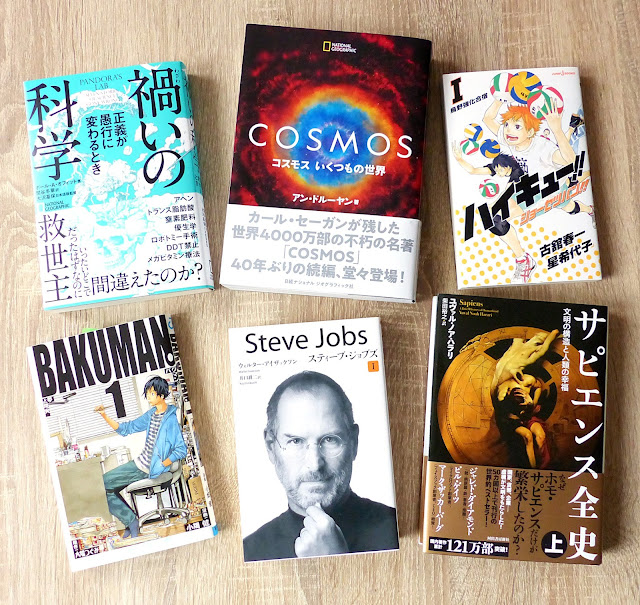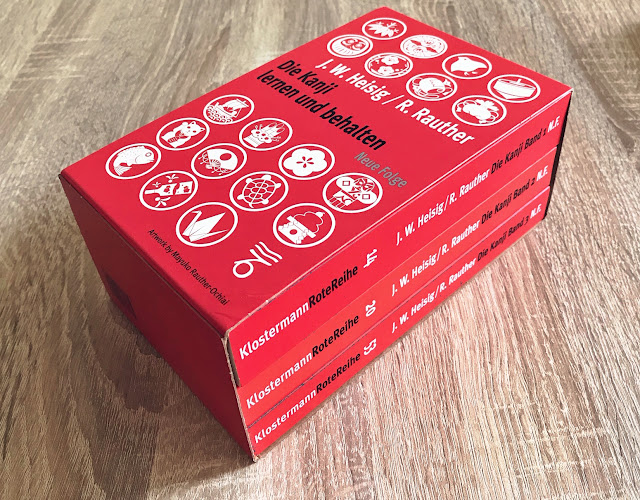Read what you love (and why the right level is still important)
(Please note that my blog is about my own experiences and thoughts. I describe what works for me and what I enjoy. Some things work well for many people, but not everything works for everyone. If something else works better for you, that's fine! Please do what works best for you. I just want to share my experiences. It's not my intention to give "instructions".)
Recently, I read the following advice:
"Don't care about the right level, read what you love!"
It's funny, because this is what I did before I switched to my current way of reading and although I tried to read articles about topics I'm very interested in I was very frustrated because I needed to look up almost every word (which is no surprise since my favorite topics are history and science XD). It was no fun at all and I didn't made any noticeable progress for months. Maybe it's because the books and topics I really love are much more difficult to read than the books other people love (certain mangas or lightnovels, for example).
Does the level matter or not?
This advice is not bad, but it really depends! Even if you love certain topics or series and are very motivated to read it in your target language, this is not a guarantee that you will really enjoy it. If it's difficult to follow the story there's not much to enjoy. At least, this is what I experienced.
In my case, choosing reading material that is around my level or only slightly above was the best decision ever. I made so much more progress since. I don't follow a certain rule, like, "read material you understand to X%" or "read material where you understand X of 10 words". I'm also really bad in guessing the level of difficulty in general. I'm not familiar with the JLPT levels. I can only describe how easy, normal or difficult it is for me. When I describe the level of difficulty it's very subjective. When I say a book is difficult, I mean it is difficult for me. If there's an excerpt, please read the excerpt and see for yourself if a certain book is at the right level for you.
I always try to read the first chapter or two to tell if I understand enough to enjoy the book. I follow my gut feeling, not strict rules. The right level is a level at where you can enjoy a book. So in that sense, level does matter in my opinion.
Example:
Easy:『ペンギン・ハイウェイ』was the easiest novel I've read so far. I looked up a few words but I was able to read it comfortably.
Normal: 『ぼくらの7日間戦争』 was normal. I needed to look up words here and there, some sentences were difficult to understand but I was able to follow the story well enough to enjoy it.
Difficult: The『ハイキュー!! 』novels are difficult at the moment. The story is not complicated but the author used a rich vocabulary to decribe even the simplest things. I'm used to not understand every detail, but this writing style made it difficult for me to understand what is going on. I really love 『ハイキュー!! 』and I will definitely come back to these novels, but I will expand my vocabulary by reading books that are easier to understand, before I try it again.
 |
| If your favorite books are too difficult at the moment, try to find books at your level. Easy books can be interesting, too. Maybe you find your next favorite book. :) |
Be flexible
Let's say you want to read this one light novel series in Japanese, because you enjoyed the anime in your native language (means, you are sure that you will love the light novel, story-wise). But when you only understand fragments (a few words or sentences here and there) so that it's very difficult to follow the story, it might not be so enjoyable as you thought. You won't get much out of the book at this stage. At least, this is how I feel.
Instead of forcing yourself to read something you "should" enjoy but which is too difficult at the moment, I think it may be a good idea to try something else for now. If your favorite light novel or manga series is too difficult at this stage, don't hesitate to try something new and broaden your horizon - you may discover your next favorite book, who knows? ;)
It's not a shame to admit that some books you are interested in are too difficult at the moment. If you are open minded and curious and also try books other than the popular manga and light novels you already know, you may discover even more books that are interesting! I've read books which seemed not so interesting in the beginning, but in the end I was so glad that I've read them. Don't judge a book by it's cover! :)
The most important thing for me is to keep going. Books I barely understand only slow me down. That's why I rather try something new at the right level instead of insisting on that one cool series which is far above my current level. I learned so much by reading books that are around my level and I enjoy this process much more than before!
When I choose a book, the content is not the only important factor. The better I understand a book the more I can enjoy the content. It is very motivating if you read a book in your target language and realize that you can follow the story without too much trouble. This can give a language learner a lot of confidence! There may be countless books you can't understand, yet, but it is a great feeling when you read something you can understand well (enough). :)
I try to raise the level of difficulty gradually (going from easy books to normal and finally to difficult books) to make it as enjoyable as possible.
Mixing the level of difficulty
I'm currently experimenting with reading books at different levels. I'm reading 『まじっく快斗』which is at a normal level but I also read a few pages of 『仕事が速いのにミスしない人は、何をしているのか?』every day. Means, my main focus is on the easier book, but I challenge myself by reading at least a few pages of the more difficult book. This way I don't get overwhelmed by the difficult book, where I need to look up much more words to understand it. So, if there's a book you can't wait to read, this strategy may be a good compromise.


Comments
Post a Comment